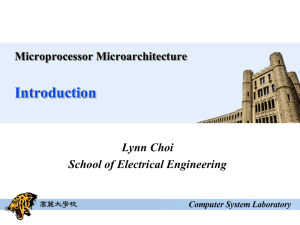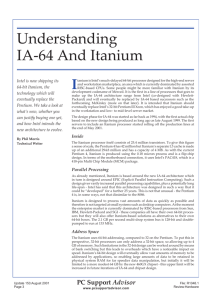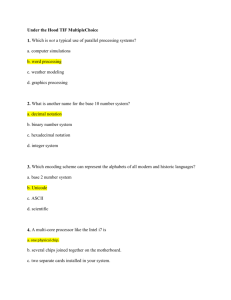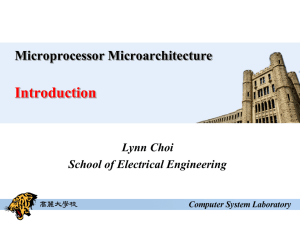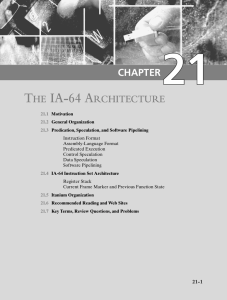Intel Itanium
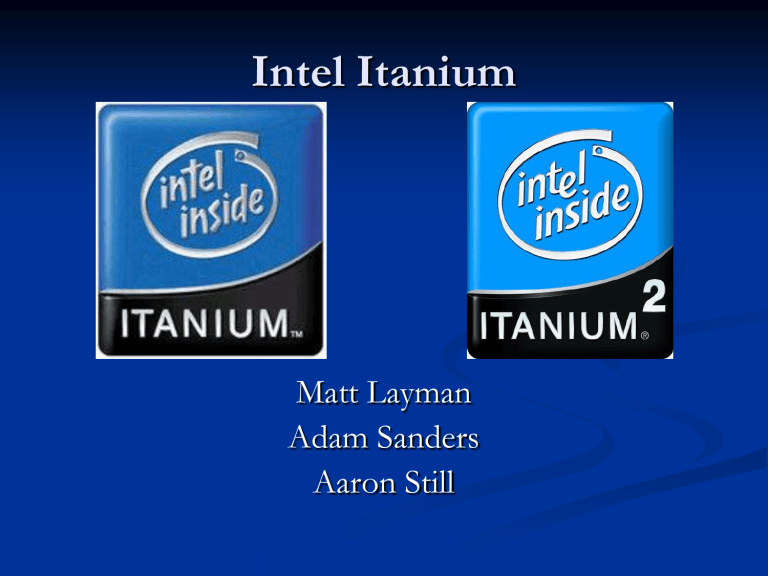
Intel Itanium
Matt Layman
Adam Sanders
Aaron Still
Overview
History
32 bit Processors (Pentium Pro, Pentium
Xeon)
64 bit Processors (Xeon, Itanium, Itanium 2)
ISA
EPIC
Predicated Execution (Branch Prediction)
Software Pipelining
Overview
ISA cont.
Register Stacking
IA-32 Emulation
Speculation
Architecture
Benchmarks
History
32 bit processors
Pentium Pro
Based on P6 core
256 kB – 1 MB L2 cache
Optimized for 32 bit code
x86 ISA
L2 cache was “on-package,” bonded to die before testing (low yields, high costs)
History
32 bit processors
Pentium II Xeon
Server replacement for Pentium Pro
Roughly comparable specs to Pro
Pentium III Xeon
Based on Pentium III core
L2 cache moved on die
Supports SSE
History
32 bit processors
Xeon
Based on Pentium 4 Netburst architecture
Hyperthreading support
SSE2 support
L3 cache added (1 – 2 MB)
History
64 bit processors
Xeon
Based on Pentium 4 Netburst architecture
SSE3 support
EM64T ISA (Intel’s name for AMD64)
Contains execute disable (XD) bit
64 bit processors
Itanium (1)
Itanium 2
History
History
Itanium (1)
Code Name: Merced
Shipped in June of 2001
180 nm process
733 / 800 MHz
Cache 2 MB or 4 MB off-die
The only version of Itanium 1
Itanium: Merced Core
History
The Itanic - Original Itanium was expensive and slow executing 32 bit code
History
French translation:
“It’s back and it’s not happy”
(loose translation)
History
Itanium 2
Common Features: 16 kB L1 I-cache, 16 kB
L1 D-cache, 256 kB L2 cache
Revisions:
McKinley, Madison, Hondo, Deerfield,
Fanwood
Upcoming Revisions:
Montecito, Montvale, Tukwila, Poulson
History
Itanium 2
Code Name: McKinley
Shipped in July of 2002
180 nm process
.9 / 1 GHz
L3 Cache 1.5 / 3 MB respectively
History
Itanium 2
Code Name: Madison
Shipped in June of 2003
180 nm process
1.3 / 1.4 / 1.5 GHz
L3 Cache 3 / 4 / 6 MB respectively
History
Itanium 2
Code Name: Hondo
Shipped early 2004 (only from HP)
2 Madison cores
180 nm process
1.1 GHz
4 MB L3 cache each
32 MB L4 cache shared
History
Itanium 2
Code Name: Deerfield
Released September 2003
1 st low voltage Itanium suited for 1U servers
180 nm process
1 GHz
L3 Cache 1.5 MB
History
Itanium 2
Code Name: Fanwood
Release November 2004
180 nm process
1.3 /1.6 GHz
L3 Cache 3 MB in both chips
1.3 GHz is a low voltage version of the
Fanwood
History
Itanium 2
Code Name: Montecito
Expected Release in Summer 2006 (recently delayed)
Multi-core design
Advanced power and thermal management improvements
Coarse multi-threading (not simultaneous)
History
Itanium 2
Code Name: Montecito
90 nm process
1 MB L2 I-cache, 256 kB L2 D-cache
12 MB L3 cache per core (24 MB total)
1.72 billion transistors per die (1.5 billion from L3 cache)
http://www.pcmag.com/article2/0,4149,222505,00.asp
Now it’s time for some Intel
Propaganda…
http://mfile.akamai.com/10430/wmv/cim.dow
nload.akamai.com/10430/biz/itanium2_everyda y_T1.asx
“Intel has not verified any of these results”
ISA Overview
Most Modern Processors:
Instruction Level Parallelism (ILP)
Processor, at runtime, decides which instructions have no dependencies
Hardware branch prediction
Itanium’s ISA
IA-64 – Intel’s (first) 64-bit ISA
Not an extension to x86
(sucks)
ISA)
(Completely new
Allows for speedups without engineering
“tricks”
Largely RISC
Surrounded by patents
IA-64
IA-64 largely depends on software for parallelism
VLIW – Very Long Instruction Word
EPIC – Explicitly Parallel Instruction
Computer
IA-64
VLIW – Overview
RISC technique
Bundles of instructions to be run in parallel
Similar to superscaling
Uses compiler instead of branch prediction hardware
IA-64
EPIC – Overview
Builds on VLIW
Redefines instruction format
Instruction coding tells CPU how to process data
Very compiler dependent
Predicated execution
IA-64
“The compiler is essentially creating a record of execution; the hardware is merely a playback device, the equivalent of a DVD player for example.”
D'Arcy Lemay http://www.devhardware.com/index2.php?option=content&task= view&id=1443&pop=1&page=0&hide_js=1
IA-64
Predicated Execution:
Decrease need for branch prediction
Increase number of speculative executions
Branch conditions put into predicate registers
Predicate registers kill results of executions from not-taken branch
IA-64
Predicated Execution:
Bank Metaphor
One form, or two?
Jerry Huck, HP
IA-64
Software Pipelining:
Take advantage of programming trends and large number of available registers
Allow multiple iterations of a loop to be in flight at once
Predicated Execution:
•
IA-64
IA-64
Register Stacking:
First 32 registers are “global”
Create “frame” in next higher registers for procedure-specific registers
When calling procedures, rename registers and add new local variables to top of
“frame”
When returning, write outputs to memory, but restore state by renaming registers – much faster
IA-64
EPIC – Pros:
Compiler has more time to spend with code
Time spent by compiler is a one-time cost
Reduces circuit complexity
IA-64
EPIC – Cons:
Runtime behavior isn’t always obvious in source code
Runtime behavior may depend on input data
Depends greatly on compiler performance
IA-64
IA-32 Support:
Done with hardware emulation
Uses special jump escape instructions to access
Slow (painfully so)
IA-64
32 Bit Hardware Emulation - Very Poor
Performance
Software Emulation of x86 32-bit from either
Microsoft or Linux can perform 50% better than Intel’s Hardware Emulation
Less than 1% of the chip devoted to Hardware
Emulation
IA-64
On 32 Bit Hardware Emulation, “Tweakers.net finds that the 32bit hardware portion of a
667Mhz Itanic wheezes along at the speed of a
75Mhz Pentium. ”
Andrew Orloski http://www.theregister.co.uk/2001/01/23/ben chmarks_itanic_32bit_emulation/
IA-64
IA-32 Slowness:
No out-of-order execution abilities
Functional units don’t generate flags
Multiple outstanding unaligned memory loads not supported
IA-64
IA-32 Support:
Hardware emulation augmented for
Itanium 2
Software emulation (IA-32 Execution
Layer) added
Runs IA-32 code at same speed as equivalently clocked Xeon
IA-64
Data Speculation:
Loads/stores issued in advance of their occurrence (when instruction bundles have a free memory slot)
Keeps memory bus occupied
For failed speculation, load/store issued when it normally would have (no real loss)
IA-64
Code Speculation:
Instructions issued speculatively to otherwise unused functional units
Results not written back (kept in a temporary area) until execution of those instructions is valid
Exceptions are deferred (to ascertain if the instruction should have ever been executed)
Overview from Tuesday
History
Itanium is 64 bit (duh!) – if we failed to communicate that to you, we failed miserably
ISA
VLIW / EPIC
Predicated Execution
Architecture
Physical Layout
Conceptual Design Elements
Byte Ordering
All IA-32 are little Endian
IA-64 is little Endian by default
Alignment
Data item size = 1, 2, 4, 8, 10, 16 bytes
Intel suggestions are “recommended for optimum speed” (read: do it this way, or don’t blame Intel for poor performance)
Large Constants
Instructions fixed at 41 bits
Constants limited to 22 bits
But actually constants have 63 bits. How?
Memory Addressing
Original Itanium addressed – 2 ^ 36 bits
(64 GB)
McKinley and later (Itanium 2) – 2 ^ 44 bits
(18 TB)
How big is an EB?
In zeroes:
00000000000000000000000000000000000000000000000000000000000000000000000
00000000000000000000000000000000000000000000000000000000000000000000000
00000000000000000000000000000000000000000000000000000000000000000000000
00000000000000000000000000000000000000000000000000000000000000000000000
00000000000000000000000000000000000000000000000000000000000000000000000
00000000000000000000000000000000000000000000000000000000000000000000000
00000000000000000000000000000000000000000000000000000000000000000000000
00000000000000000000000000000000000000000000000000000000000000000000000
00000000000000000000000000000000000000000000000000000000000000000000000
00000000000000000000000000000000000000000000000000000000000000000000000
00000000000000000000000000000000000000000000000000000000000000000000000
00000000000000000000000000000000000000000000000000000000000000000000000
00000000000000000000000000000000000000000000000000000000000000000000000
00000000000000000000000000000000000000000000000000000000000000000000000
000000000000000000000000000000…
This is only 2 ^ 10 digits. 1 EB would be 2 ^54 times bigger than this.
Registers
128 82-bit Floating Point Registers
1 bit sign, 17 bit exponent, 64 bit mantissa
128 64-bit General Purpose Registers
64 1-bit Predicate Registers
8 64-bit Branch Registers
Used to hold indirect branching information
8 64-bit Kernel Registers
Registers
1 64-bit Current Frame Marker (CFM)
Used for stack frame operations
1 64-bit Instruction Pointer (IP)
Offsets to one byte aligned instruction OR holds pointer to current 16 byte aligned bundle
Registers
256 1 bit NaT and NaTVal registers (Not a
Thing)
Indicates deferred exceptions in speculative execution
Several other 64 bit registers
Register File
Floating Point Registers
8 read ports
4 write ports
General Purpose Registers
8 read ports
6 write ports
Register File
Predicate Registers
15 read ports
11 write ports
Register Stack Engine (RSE)
Improve performance by removing latency associated with saving/restoring state for function calls
Hardware implementation of register stack ISA functionality
Itanium Pipeline
10 Stage
Instruction Pointer Generation
Fetch
Rotate
Expand
Rename
Word-Line Decode
Register Read
Execute
Exception Detect
Write Back
Itanium 2 Pipeline
8 stage
Instruction Pointer Generation
Rotate
Expand
Rename
Register Read
Execute
Detect
Write Back
Processor Abstraction Layer (PAL)
Internal processor firmware
External system firmware
Parallel EPIC Execution Core
4 Integer ALUs
4 Multimedia ALUs
2 Extended Precision FP Units
2 Additional Single Precision FP Units
2 Load / Store Units
3 Branch units
6 instructions per clock cycle
Instruction Prefetch and Fetch
Speculative fetch from instruction cache
Instruction go to decoupling buffer
Hides instruction cache and prediction latencies
Software-initiated prefetch
I-Cache
16KB
4-way set-associative
Fully pipelined
32B deliverable (6 instructions in 2 bundles)
I-TLB
Fully associative
On-chip hardware page walker
Branch Prediction
4 way hierarchy
Resteer1: Special single-cycle branch predictor
Resteer2: Adaptive two-level mutli-way predictor
Resteer3-4: Branch address calculate and correct
Itanium 2: Simplified
0-bubble branch prediction algorith with a backup branch preciction talbe.
Instruction Disperse
9 issue ports
2 memory instruction
2 integer
2 floating-point
3 branch instructions
Itanium 2 – 11 issue ports
Q: How many Intel architects does it take to change a lightbulb ?
A: None, they have a predicating compiler that eliminates lightbulb dependencies. If the dependencies are not entirely eliminated, they have four levels of prediction to determine if you need to replace the lightbulb.
Decoupling Buffer
Hides latency from cache and misprediction
Disperses instructions to pipeline
Granular dispersal
Itanium Execution Core
4 ALU
4 MMX
2 + 2 FMAC
2 Load / Store
3 branch
Itanium 2 Execution Core
6 multimedia units
6 integer units
2 FPU
3 branch units
4 load / store units
Data Dependencies
Register Scoreboard
Hazard detection
Stall on dependency
Deferred stalling
Floating Point Unit
FPU Continued
Independent FPU register file (128 entry)
4 write, 8 read
6.4 Gflops throughput
Supports single, double, extended, and mixed mode precision
Can execute two 32bit single precision numbers in parallel
Pipelined
Control
Exception handler
Exception prioritizing
Pipeline control
Based on the scoreboard, supports data speculation as well as predication
Memory Subsystem
Advanced Load Address Table
Data speculation
32 entries
2 way set-associative
IA-32 Execution Hardware
http://www.pcmag.com/article2/0,4149,222505,00.asp
Benchmarks
Benchmarks
http://www.ideasinternational.com/benchmark/spec/specfp_s2000.html
Benchmarks http://www.jrti.com/PDF/altix_benchmarks.pdf



